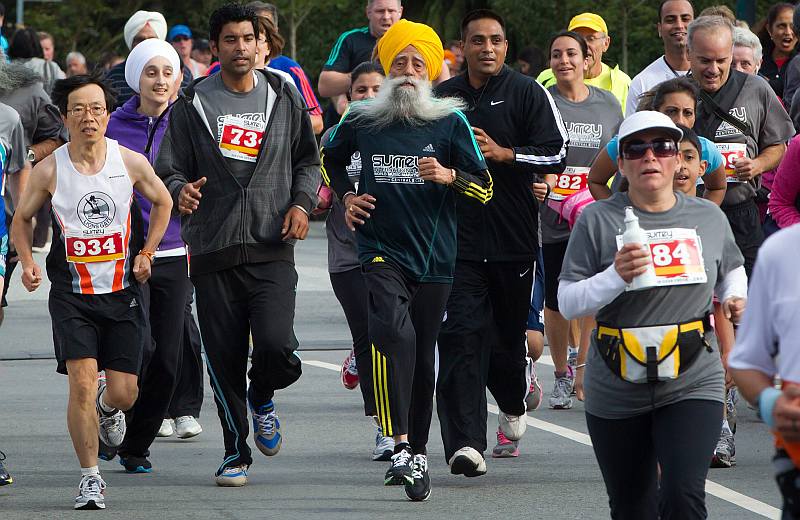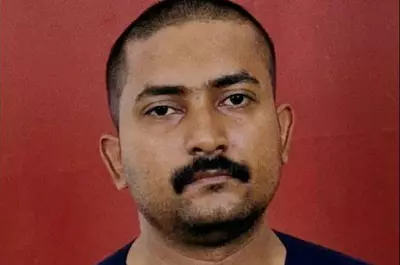Within a span of 13 years, between 2000 and 2013, Fauja Singh has participated in 17 international marathons, His last the Hong Kong Marathon, was run in 2013.
Here is a man who defies all odds, and is running against Time – and winning every time. But that’s not all; over the years, he has just kept getting better and better at running, winning every race along the way. He’s become so good that now he doesn’t know how to stop. He has practically left everyone far behind, in a sense the whole world – even Time.
Meet 110-year-old Fauja Singh, a super champion marathon runner without an equal in the world. In his age and category, he has run the world’s most prestigious and most challenging marathons and won; he is still breaking records and setting new ones. He has become a living and enduring icon of athletic excellence, a symbol of hope and inspiration for millions of people around the world of all ages – little kids, teenagers, youth, people in their middling years and senior citizens.
When he runs, he looks no less than a demi-god, his commanding presence filling people with awe and reverence as they lustily cheer him along. His tall, lithe frame moves with a graceful rhythm, his flowing, silvery beard flying in the wind and his white turban, completing a compelling picture of surreal elegance.
At age 100, he set 8 world records in one day at the Special Ontario Masters Association Fauja Singh Invitational Meet, held at Birchhead Stadium in Toronto, Ontario, Canada.
And to think that in the early years of his infancy, he couldn’t walk at all. Right from the time of his birth on April 1, 1911, in the Beas village of Jallandhar district in the Indian State of Punjab up to the age of five, he couldn’t walk at all. All his family members, a large joint family of Sikh farmers, had resigned themselves to the fact that this child of theirs would never ever walk. The fact that Fauja’s three other siblings were normal, hale and hearty kids, was a source
of some comfort and consolation to the parents
But Fauja’s mother never gave up hope. She would regularly visit the nearby gurudwara in the village and pray for a miracle. Sometimes, she would carry the little child in her arms, take him to the gurudwara, and ask the temple elders to bless him and pray for his recovery. Five years quickly went by with no change in his condition.

And then suddenly one day without warning, Fauja just got up and started walking. There was untold joy among his parents and other family members. His mother couldn’t contain her happiness; she made ‘laddoos’, a typical Indian sweet that marks any and every celebration, festival or special occasion in India, and distributed it among every household and family in the village.
But it would take some time before Fauja could become a normal and healthy child. He was frail and sickly. The neighbourhood kids poked fun at him and called him ‘Danda’. He seemed to look like a wooden staff or pole that villagers usually carried around, either for protection or because they had to walk long distances, or then perhaps just to give themselves an air of authority.
His frail health did not allow him to go to the village school, some seven-eight miles away. The school-going kids had to walk all the way up to the school carrying their notebooks or slates and then walk back again.
As time went by and piled up into years, the young Fauja grew into a fine lad, tall, sturdy and robust. The fresh air of the open countryside on the farm was more than a tonic. Add to that was the simple, and home-cooked food – lentils (what people in India call ‘dal’), farm-fresh vegetables, milk, yoghurt, lassi (churned yoghurt with either some salt of sugar and a big dollop of homemade butter in it), together with piping hot flatbread smeared with butter or ghee. All this worked wonders and transformed Fauja into a strong, strapping youth, brimming with health and vitality. Around 19-20, his parents got him married and Fauja quickly settled into the peaceful and settled life of a simple farmer.
We need to now to shift our focus from his home and family life and move to the more recent years of his life to better understand the circumstances and events that acted as catalysts and transformed an 80-plus , 5 feet, 8 inches, 52 kg Sikh gentleman into a human dynamo, an unstoppable powerhouse, a superman who couldn’t stop running, so much so that now there are no more records left to break’. He has smashed them all. Indeed he straddles the world like a mighty colossus and keeps on running – even at 110.
At age 100, he set 8 world records in one day at the Special Ontario Masters Association Fauja Singh Invitational Meet, held at Birchhead Stadium in Toronto, Ontario, Canada.
Back home in his village (Beas, Jallandhar), a series of personal tragedies took their toll on his quiet and happy life. . First, his wife passed away in 1992. Around about the same time, a daughter died during childbirth. Later in 1994, his fifth son Kuldip was killed in a freak accident. All this led him to move to England to live with one of his sons in Illford.
Rather than let his life ebb away in idleness doing nothing, Fauja decided to turn to sports to remain occupied and productive. Accordingly, he approached a marathon coach, a Sikh gentleman, to get started in right earnest.

On the first day they met, his coach was highly amused to see that Fauja had turned up in a three-piece suit. Anyway, his coach soon put him on the right track. He was then 89, but he had the enthusiasm and dedication of someone half his age. By now, he was running in a lot of local marathon events. At 93, he completed a marathon in 6 hours and 54 minutes., knocking off 58 minutes off the previous world best for anyone in the 90-plus age bracket.
When he ran his first major race in 2000, the London Marathon, he was 100. In his practice runs daily, he was doing 20 km. He thought he could easily run the London Marathon, because he had mistakenly presumed it to be just 26 kms. He would soon discover the distance was actually 26 miles, around 42 kms. But this did not deter him. With the help and guidance of his coach, he trained harder than before.
The doughty Sikh holds the record for 200,400, 800, the mile, and 3000 metres all run in one day within a span of 94 minutes.
At age 100, he set 8 world records in one day at the Special Ontario Masters Association Fauja Singh Invitational Meet, held at Birchhead Stadium in Toronto, Ontario, Canada.
Three days later, he became the first 100-year old to finish a marathon, completing the Toronto Waterfront Marathon in 8 hours, 25 minutes and 17 seconds. The Guinness Book of records refused to acknowledge his achievement because he did not have a valid birth certificate, although he showed his passport and a letter from Queen Elizabeth II, congratulating him on his 100th birthday.
Fauja carried the Olympic torch in July 2012. He has appeared in advertisements for Addidas along with David Beckham. He was awarded the British Empire Medal in 2015.
On Nov 13, 2013, Fauja was awarded the Ellis Island Medal of Honour by the National Ethnic Coalition, a US group that advocates ethnic pride and tolerance. Coalition Chairman William Fugaszy says: “Singh is a symbol of racial tolerance, and his running helps bridge the gap created by the September 11 terrorist attack. A UK-based organisation awarded him the Pride of India title in 2011. He says the secret of his long life, stamina and vitality is a simple lifestyle and simple food and total abstinence from liquor and smoking
In conclusion, all that one can say is that Fauja has outrun every race in the world. In fact, it will not be wrong to say that he has even outrun Time.











